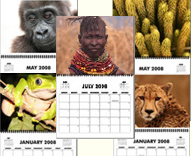
|
|
|
mongabay.com news - February 2006World temperatures highest in 1200 years 02/10/2006 World temperatures are higher than in any period over the last 1,200 years, according to a study published in the current issue of Science. Polar bear may be listed as endangered species 02/09/2006 The U.S. Fish and Wildlife Service today announced that it is considering a petition to list the polar bear (Ursus maritimus) as threatened under the Endangered Species Act. Scientists believe polar bear populations are increasingly in danger due to the effects of climate change, specifically receding ice and warming temperatures. Largest solar power plant in a generation to be built in Nevada 02/09/2006 The groundbreaking for the largest solar thermal power plant to be built in 15 years takes place this weekend in Boulder City, Nevada. The 64MW Nevada Solar One power plant will generate enough power to meet the electricity needs of about 40,000 households and follows in the steps of the 354MW solar thermal power plants located in California's Mojave Desert. While California's solar plants have generated billions of kilowatt hours of electricity for the past two decades, the Nevada Solar One plant will use new technologies to capture even more energy from the sun Volcanic eruption cut warming in 20th century 02/09/2006 Ocean temperatures might have been warmer and sea levels would have risen higher in the 20th century had Krakatoa not erupted in 1883, said a team of scientists. According to the researchers, the release of ashes and aerosols into the upper atmosphere had a significant long-term impact on global climate. Medicinal value of chocolate explored by scientists 02/09/2006 The cocoa plant (Theobroma cacao) holds tremendous potential to impact public health and improve the socioeconomic and ecological landscape of the countries where it's grown, according to leading world scientists who convened at the National Academies today to examine the latest scientific advances in cocoa research. The Greening of Wal-Mart? 02/08/2006 While Wal-Mart is a favorite target for a broad spectrum of activist groups, the world's largest retailer has taken a number of steps in recent months to improve the environmental sustainability of its operations. Pictures of newly discovered T-Rex dinosaur 02/08/2006 A team of scientists led by James M. Clark, Ronald B. Weintraub Associate Professor of Biology at The George Washington University, and Xu Xing of the Institute of Vertebrate Paleontology and Paleoanthropology in Beijing, have discovered a new genus and species of dinosaur that is the oldest known and most primitive tyrannosauroid. Chinese invaders threaten Britain 02/08/2006 An exotic type of crab is spreading at an alarming rate throughout Britain's coast and rivers, a new study shows. The Chinese mitten crab (pictured), brought to Britain during the last century in ships' ballast water, could cause devastating environmental problems if populations are not monitored and controlled, say the study's authors. Lake Victoria illegally drained for electricity in Uganda 02/08/2006 Lake Victoria, Africa's largest freshwater lake, is being covertly drained for hydroelectric power according to an article published in the Feb. 11 New Scientist magazine. The report, written by Fred Pearce, says that Uganda is violating a 50-year-old international agreement designed to protect the lake. The following is a release from the New Scientist. Microfinance key to alleviating poverty in forest communities 02/08/2006 Giving poor forest-dwellers access to basic financial services is a key element in helping them improve their living standards, according to a new FAO publication. Climate change increases California flood, drought risk 02/07/2006 Climate change may increase the risk of winter floods and summer water shortages--even within the same year--says new research by scientists Lawrence Livermore National Laboratory. The study, which appeared in the January 27 edition of the journal Geophysical Research Letters shows that global warming is likely to change river flows in ways that may result in both increased flood risk and water shortages. Pictures of new species discovered in New Guinea 02/07/2006 A team of scientists led by Conservation International (CI) found dozens of new species in a survey of New Guinea's Foja Mountains. The December 2005 trip by a team of U.S., Indonesian, and Australian scientists discovered new species of frogs, butterflies, plants, and an orange-faced honeyeater, the first new bird from the island of New Guinea in more than 60 years. Scientists discover dozens of new species in New Guinea 02/06/2006 A team of scientists led by Conservation International (CI) found dozens of new species in a survey of New Guinea's Foja Mountains. The discoveries were made under CI's Rapid Assessment Program (RAP) which deploys expert scientists to poorly understood regions in order to quickly assess the biological diversity of an area. The conservation organization makes RAP results immediately available to local and international decision makers to help support conservation action and biodiversity protection. Barges could protect Europe from climate change deep freeze 02/06/2006 It is ironic that one consequence of global warming is that Europe might plunge into a deep freeze. This possibility stimulated an unusual research project at the University of Alberta. Fungus may be devastating amphibian populations worldwide 02/06/2006 Her most likely culprit is a hugely infectious disease caused by a fungus. In just four months -- from mid-September of 2004 to mid-January of 2005 -- Lips and her colleagues saw more than half the amphibian population of El Cope, Panama, sicken and die from this disease. Malaria linked to Amazon deforestation 02/02/2006 A pair studies in the Amazon rainforest suggest a link between deforestation and an increased risk of malaria. The first study, conducted in the Peruvian Amazon and published in January's issue of the American Journal of Tropical Medicine and Hygiene, found that malaria epidemics in the region were correlated with deforestation. The later research, released in last week's Proceedings of the National Academy of Sciences indicates that forest clearing around settlements in the Brazilian Amazon increases the short-term risk of malaria by creating areas of standing water in which mosquitoes can lay their eggs. New tropical timber pact takes aims at illegal logging 02/01/2006 Late last week, countries that export and export tropical timber reached a 10-year agreement to help promote the sustainable development of forests while fighting illegal logging. In search of Bigfoot, scientists may uncover unknown biodiversity in Malaysia 02/01/2006 Malaysian scientists are scouring the rainforests of Johor state in search of the legendary ape-man Bigfoot, supposedly sighted late last year. But they are more likely to encounter some less fantastic but unique creatures that dwell in these still unexplored ecosystems. Investors with $31 trillion pressure firms on climate change 02/01/2006 A group of 211 institutional investors with assets of $31 trillion under management is writing to 1,933 of the world's largest public companies asking for the disclosure of investment-relevant information concerning their greenhouse gas emissions. African carnivores under threat -- top 20 at risk listed 02/01/2006 It may still be king of the beasts, but the African lion's kingdom is dwindling, according to a new report released by the New York-based Wildlife Conservation Society (WCS) that says these emblematic big cats have disappeared from 82 percent of their historic distribution over the past several decades. The 200-page report looked at the conservation status of the 20 largest species of African carnivores and examined priorities to help ensure that they persist on the continent. Biofuels can replace about 30 percent of fuel needs 02/01/2006 With world oil demand growing, supplies dwindling and the potential for weather- and conflict-related supply interruptions, other types of fuels and technologies are needed to help pick up the slack. Great Barrier Reef in Trouble says Australian Scientist 02/01/2006 Australia's Great Barrier Reef may be at risk of one of its worst coral bleaching event on record warned a leading Australian scientist Tuesday. News index | RSS | News Feed Advertisements: Organic Apparel from Patagonia | Insect-repelling clothing |
MONGABAY.COM
WEEKLY NEWSLETTER
T-SHIRTS 
CALENDARS 
CANVAS BAGS 
|
|
Copyright mongabay 2009 |





